Islands just kilometres from China that are ‘vulnerable’ to invasion
Lying just 10 kms off one of China’s largest cities, this tiny island is on the frontline should China ever choose to flex its military muscle.
For those who live in Taiwan, China may loom large on their consciousness but geographically it’s still some way over the horizon – 160 kilometres distant.
Not so for the 120,000 residents of the island of Kinmen; China looms large both figuratively and geographically.
This outpost of Taiwan is so close to the Chinese mainland, just 10 clicks as the crow flies, islanders can clearly see the twinkling lights in the skyscrapers of the city of Xiamen on the mainland.
More ominously, this symbol of capitalism and democracy on Beijing’s doorstep is also within easy shelling distance. The tank traps that line Kinmen’s beaches aren’t for show – China has tried to invade before.
With Beijing ratcheting up the sabre rattling over a possible forced unification with Taiwan, an expert on cross strait relations has said Kinmen is very “vulnerable”.
Not only to military action though. Beijing is also trying subtler means to bring the island into its orbit and further away from Taiwan’s.
“In a manner, Kinmen has been put at the mercy of China.” Wen-Ti Sung, a visiting fellow at ANU’s Australian Centre for China on the World told news.com.au from Taiwan’s capital, Taipei.
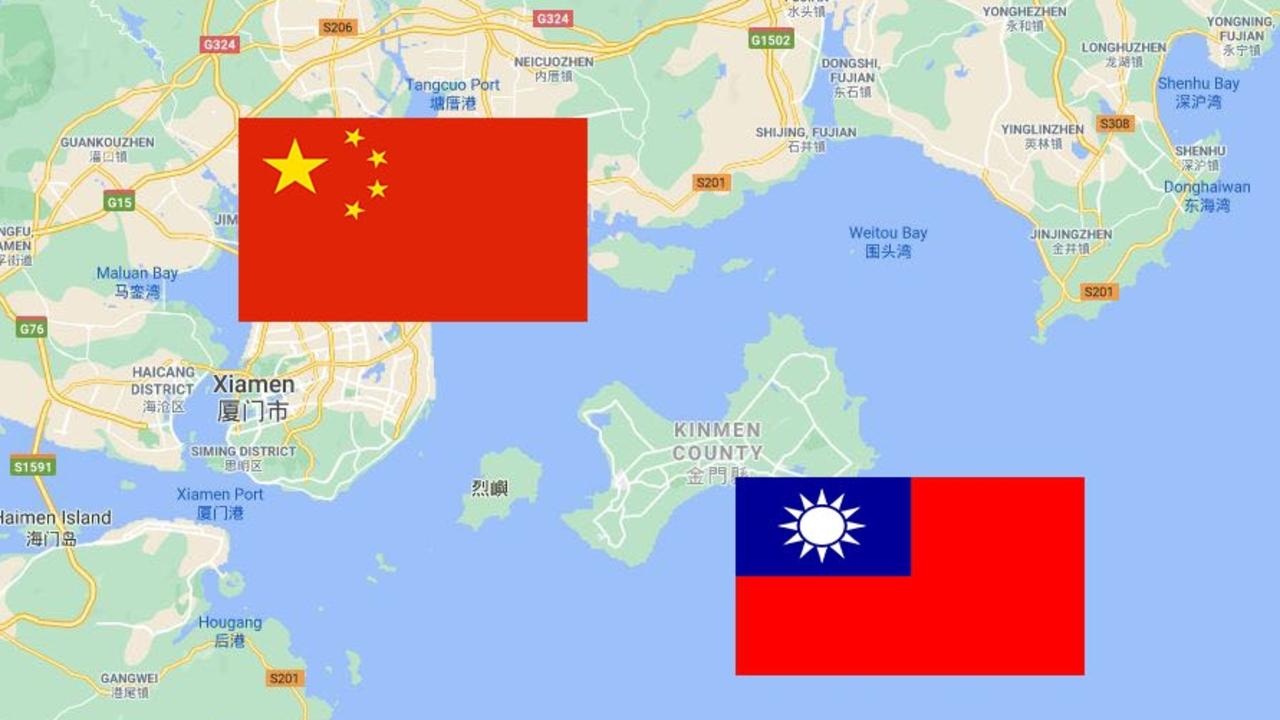
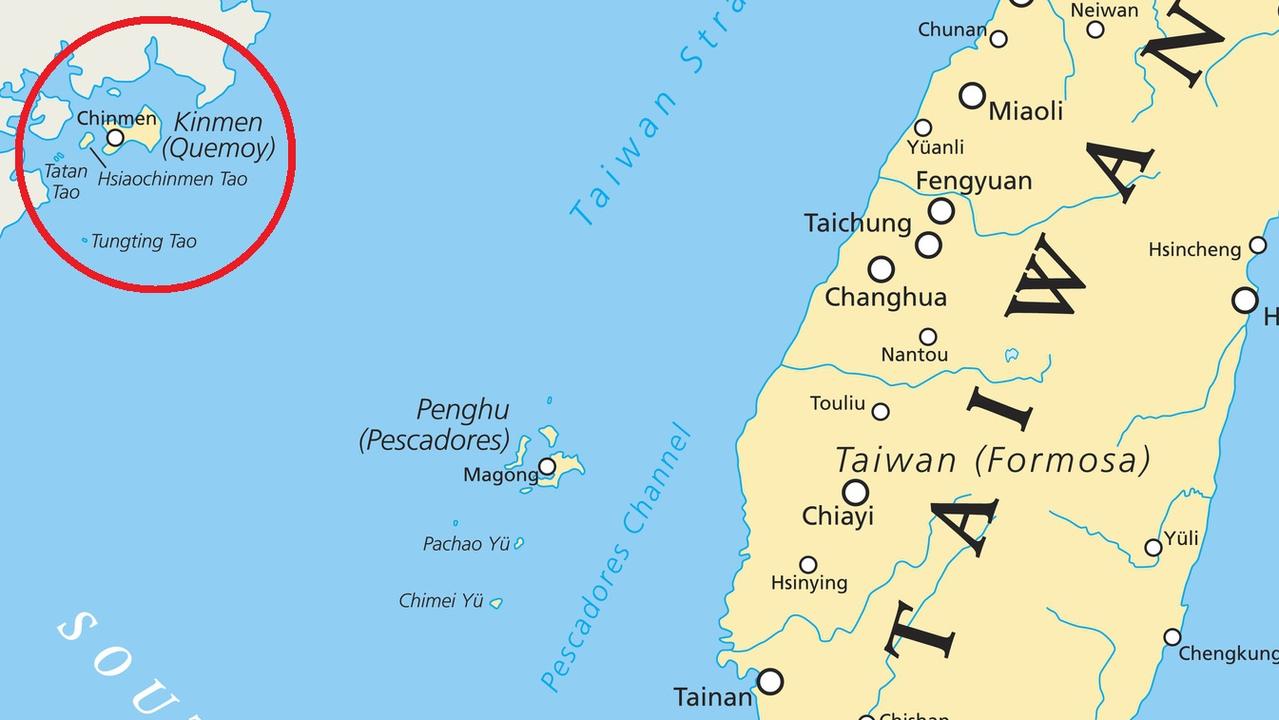
RELATED: China could be triggered by US special forces training on Taiwan
When most people think of Taiwan, they probably think of a large island in the South China Sea.
But the nation of Taiwan also includes a smattering of other islands including several just off the mainland coast - these include Kinmen and, further north, Matsu.
This anomaly goes back to the Chinese Communist revolution of 1949. When Mao Tse Tung’s Communist forces overran the mainland, the nationalist forces of the Kuomintang party fled offshore to Taiwan and a flotilla of other islands.
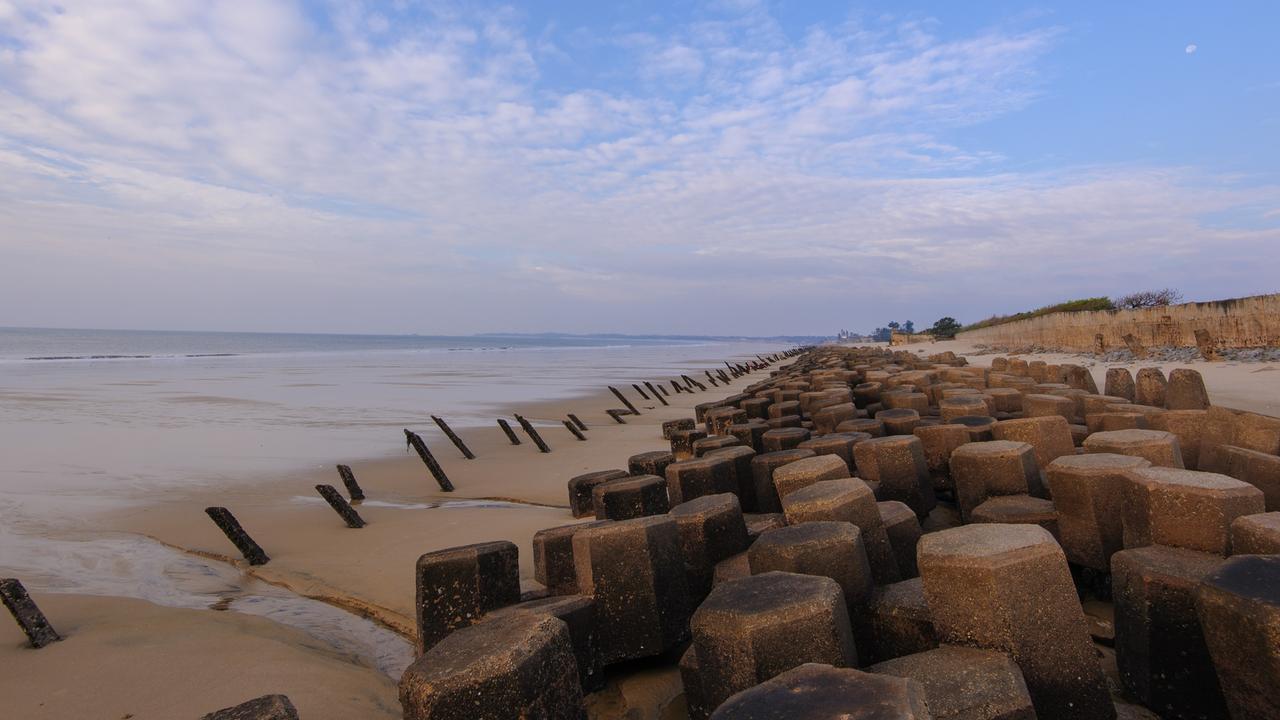
Chairman Mao wasn’t happy and that same year attempted to take Kinmen. But despite its proximity, the plan was a flop.
“They did try, but the People’s Liberation Army simply didn’t have enough amphibious warfare capacity,” said Mr Sung.
“They flirted with the idea again in 1958, but it didn’t work again.”
Several other skirmishes eventually petered out which has left the awkward status quo intact for more than 70 years.
RELATED: ‘War will come’ warns Beijing after Taiwan stocks up on US-made missiles
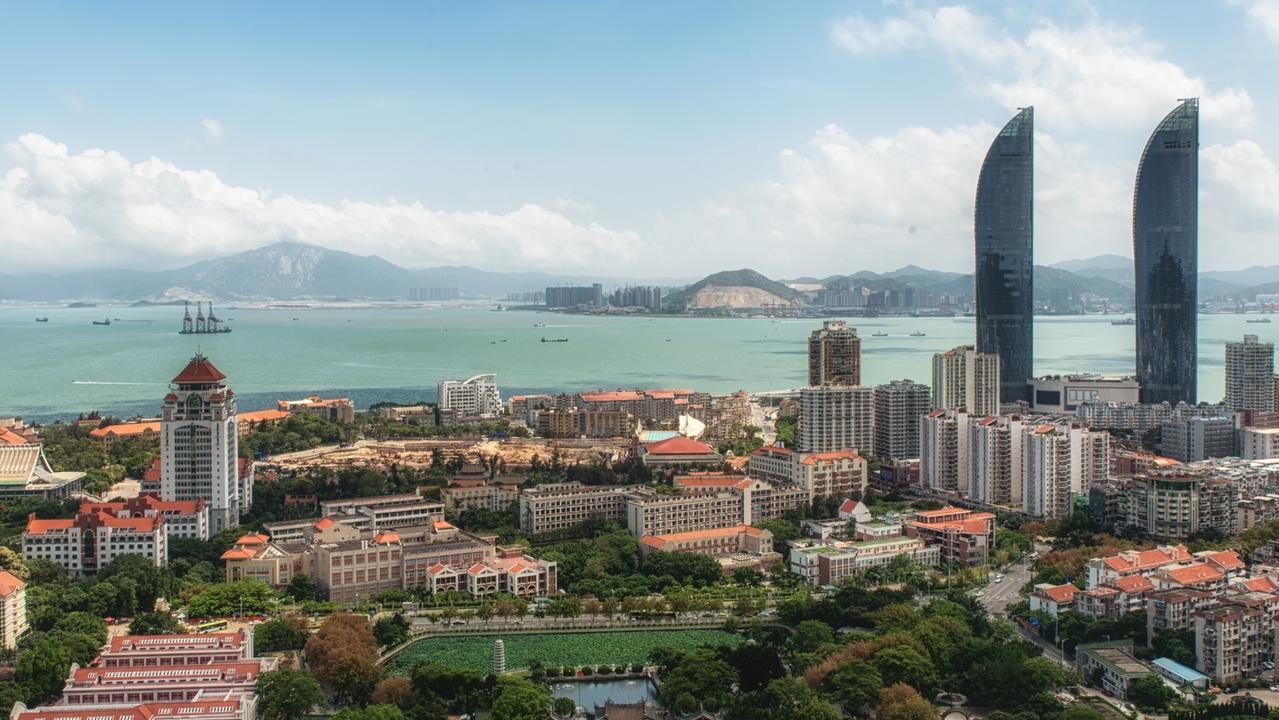
BEIJING WANTS TAIWAN, BAD
Taiwan, never ruled by the Communists, has developed into a fully independent nation in all but name. However, China still sees it as an errant province that must be brought to heel.
Beijing’s wrath was stoked in 2016 when Tsai Ing-wen of the Democratic Progressive Party’s (DPP), which sees Taiwan’s future as separate from the mainland, was elected President.
Since then, China’s leader Xi Jinping has become increasingly strident in his threats to take Taiwan – and with it Kinmen – by force.
But Beijing’s threats and China’s snubbing out of Hong Kong’s freedoms only resulted in Ms Tsai being re-elected in a landslide earlier this year.
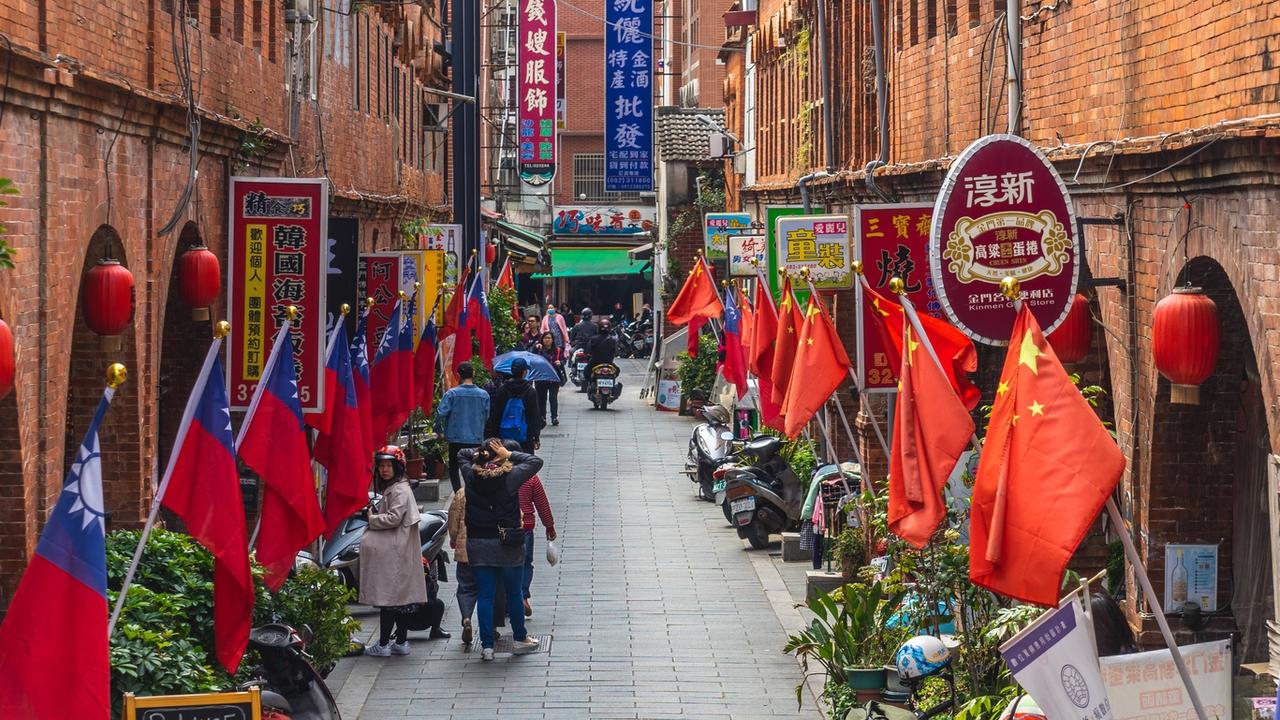
‘WE’RE ON THE FRONT LINE’
In Kinmen, however, Ms Tsai garnered just 21 per cent of the vote in the 2020 poll. That might seem like a failure, but Mr Sung said it was the opposite.
“Kinmen has usually been super unfriendly to the DPP; in 2018 it only got four per cent of the vote.
“The attitude has seemed to be ‘you (Taiwan proper) can be happy and independent but we’re on the frontline, we’ll be the first to go’,” he said.
“But the ruling party did a good job to heighten the Chinese military threat.”

Kinmen has always been different to the rest of Taiwan. There is a different attitude here to its big and provocative neighbour.
Prior to 1949, it wasn’t part of Taiwan at all but governed by the mainland’s Fujian province.
Residents of Kinmen share a dialect and a history with those that are now just a 22 minute ferry ride away across the bay. On some streets Taiwanese and Chinese flags flutter side by side,
“Kinmen and Matsu were never ceded to Japan, so they don’t share much of that defining Taiwan historical experience,” Mr Sung said.
There are also some grumbles with Taipei. The 2013 withdrawal of thousands of troops from the island and a cutting back of the civil service rocked the local economy. Tourism from mainland China has kept Kinmen afloat.
Nonetheless, the people of Kinmen value the democracy being part of Taiwan brings.
As tensions ratchet up across the strait, the fear is Beijing may make good on its threat to take Taiwan by force. Kinmen would be a tasty appetiser for the main meal.
“Kinmen and Matsu are vulnerable; Taiwan could not defend them with conventional weapons,” said Mr Sung.
“It’s feasible (they could be invaded) but I don’t think there’s a benefit to China to taking them.
“They’re not completely off the table but threats against them are a way of exerting pressure on Taiwan.”
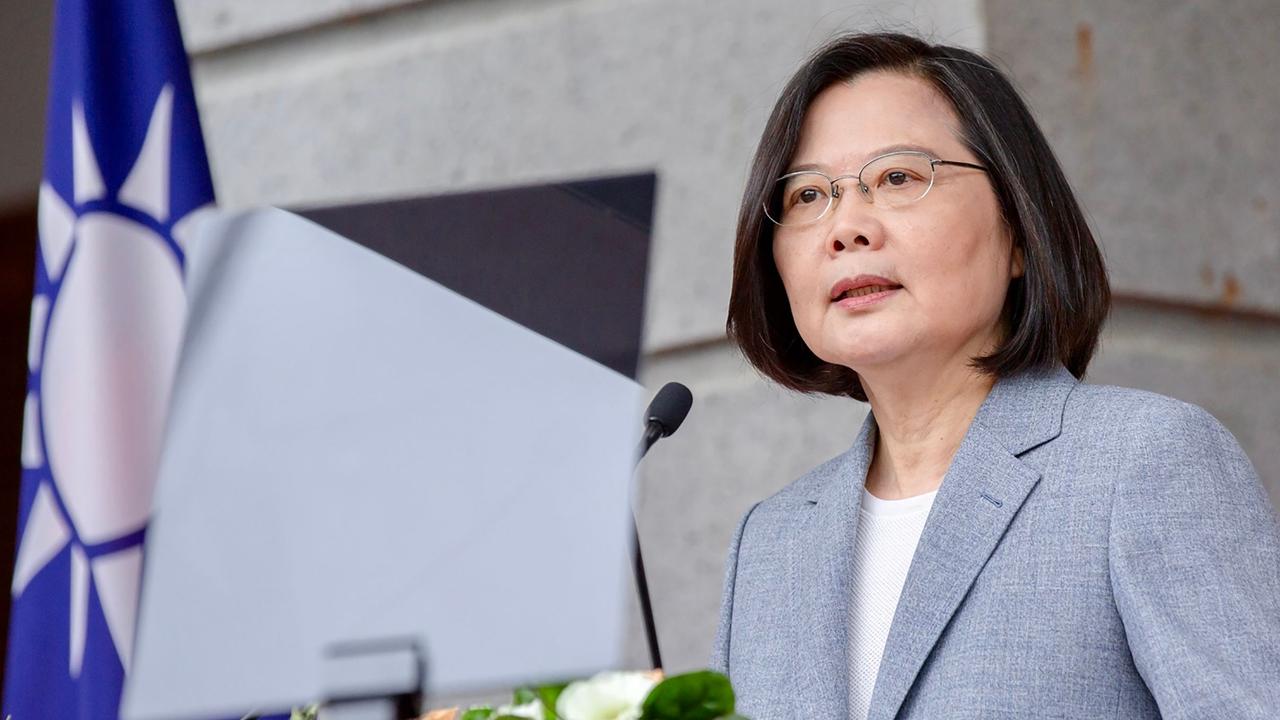
WHAT WOULD WASHINGTON DO?
Mr Sung said there were two reasons China, in recent years, has been reticent about military action against Kinmen.
“One is symbolic. As Kinmen was never part of Taiwan (province), the People’s Republic of China (PRC) doesn’t want Taiwan to feel too comfortable being only Taiwanese. It’s like if I spent all my time with Queenslanders I’d feel I was just a Queenslander, not Australian.
“So they leave Kinmen alone because it is an umbilical cord to greater China,” he said.
Then there’s the other reason, a reason that focuses minds in Beijing: Washington’s reaction.
The US hasn’t said it would retaliate if China invaded Kinmen or Matsu – but it hasn’t said it wouldn’t either.
“The US has somewhat ambiguous security guarantee for Taiwan. If China messed with Taiwan the US may intervene militarily, so while the PRC has the capacity to take Kinmen, it may too small a gain for such a big gamble.”
Instead, Beijing has some juicy carrots for the people of Kinmen.
As well as the scores of tourists with big wallets visiting from the mainland, China now also supplies Kinmen with drinking water. There are plans for electricity and gas links and even a bridge to Xiamen.
“This will have the effect of a greater Chinese civilian presence on Kinmen and will mean the island will be more dependent on the mainland,” said Mr Sung.
He speculated that if Beijing was to nab any Taiwanese controlled islands, it would probably be Taiping Island which is inhabited only by soldiers.
“Taiping is further away and out of view so if China took it wouldn’t upset as many people as taking Kinmen.”
What’s not in doubt is the Beijing dictatorship’s steadfast resolve that it rightfully owns Taiwan – whatever the Taiwanese themselves might think.
If China took the drastic step of invasion the island floating just offshore one of its largest cities would likely be the first chunk of Taiwan to succumb.




